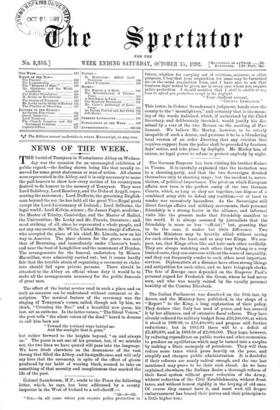The German Emperor has been visiting his brother-Kaiser in Vienna.
It is carefully explained that the invitation was to a shooting-party, and that the two Sovereigns devoted themselves only to shooting stags ; but the incident is, never- theless, of political importance. The pivot on which European affairs now turn is the perfect amity of the two German Courts, which, so long as they act together, can dispose of a combined army able to defeat any coalition,—or at least to render war excessively hazardous. As the Sovereigns still direct foreign affairs and military movements, their personal friendship is a strong factor in the alliance, and informal visits like the present make that friendship manifest to the world. It is always assumed by journalists that the friendship is more or less " official ;" but, granting that to be the case, it makes but little difference. Two Cabinet Ministers may be heartily allied without caring for each othesin the least, and so may two Kings. We sus- pect, too, that Kings often like and hate each other cordially. They are always watching each other, they belong to a very limited caste, they can converse without the sense of inequality, and they can frequently render to each other most important services. Diplomatists at a distance have often strong likings and antipathies for each other, and so have telegraph clerks. The fate of Europe once depended on the Emperor Paul's personal regard for Frederick the Great, whom he had never seen, and who was nearly ruined by the equally personal hostility of the Czarina Elizabeth.


































